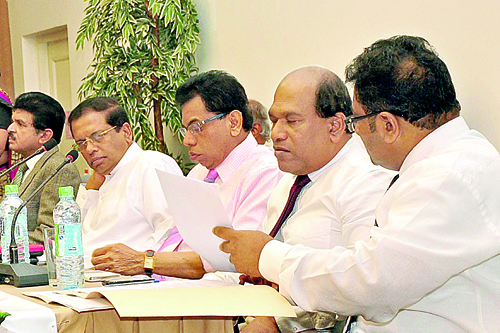News
Two more weeks to present views on draft laws on medicinal drugs
The Health Ministry on Friday bowed to criticism over draft laws covering medicinal drugs, providing two weeks for critical public views, even as there was a suggestion that conflicts in the ministry were seen delaying their implementation.
During a public discussion on the draft National Medicinal Drugs, Devices and Cosmetics Regulatory Authority Act at the packed-to-capacity auditorium of the National Blood Transfusion Service at Narahenpita, Health Minister Maithripala Sirisena gave this assurance: “Anyone can meet me personally and hand in their written comments and views within the next two weeks.”
However, Legal Draftsman Aruna Shantha de Silva said that while he has been treating this as a priority issue and working to complete the process, there appear to be conflicts of interest in the ministry which are delaying the completion of a final draft of this Act.
The minister also told the seminar organised by the ministry in collaboration with the Sri Lanka Medical Association (SLMA) that another seminar could be arranged for the public and other stakeholders to present their suggestions, ideas and objections, if

Speakers at the discussion on the draft National Medicinal Drugs, Devices and Cosmetics Regulatory Authority Act. Pic by Mangala Weerasekara
necessary. His comments came as several concerns were raised during the discussion which drew a large audience, with some overflowing onto the corridor. In the audience were high-levelmedical administrators, top doctors, members of the pharmaceutical industry, pharmacists and patients’ rights groups.
The ministry is already entertaining public views on the proposed Act through its www.health.gov.lk website but the minister’s suggestion on Friday reinforced the call for more public debate, which however would further delay its implementation.
“While the minister seems to be reasonable in accommodating all views, there is concern that this will further delay implementation of a proposed law that has been on the back burner for more than four years,” a top medical professional said.
The proposed Act has been under discussion since the National Medicinal Drug Policy (NMDP) was introduced in 2005. The draft Act is set to cover a range of issues including often-costly drugs, ineffective drugs and too many brands in the market, which are common concerns amongst the public.
The marathon three-hour seminar on Friday beginning with introductory remarks by Minister Sirisena, Health Services Director-General Dr. Palitha Mahipala, SLMA President Dr. Palitha Abeykoon and a ‘critical appraisal’ of the proposed Act by Prof. R.L. Jayakody, Professor of Pharmacology of the Colombo Medical Faculty, were followed by numerous earnest and passionate suggestions and critiques. The newly-appointed Health Ministry Secretary Sudharma Karunaratne, was also present.
According to Prof. Jayakody there should be three documents – the Policy, the Act and the Regulations, but what was available were only the Policy and the draft Act.Both “major and minor concerns” in the latest draft were presented in a nutshell by Prof. Jayakody. Before embarking on the ‘appraisal’, he explained the “elements” or global yardstick of an effective regulatory system – decisions based on scientific evidence and facts; provision of efficient and timely services; availability of regulatory enforcement and power; application of sound management principles; cost-effectiveness; accountability; and safeguards against corruption and conflict of interest issues.
A “major” concern he had was that the draft Act did not mention the National Standing Committee (NSC) which would oversee implementation of the NMDP and carry out regular monitoring of the pharmaceutical sector through indicator-based surveys.
“Give recognition to the NSC,” was Prof. Jayakody’s suggestion, a view echoed during the discussion, as otherwise representation of important groups such as patients would be lost.
Prof. Jayakody queried the fact that the chairperson of the proposed Regulatory Authority is to be identified from among the four persons who are professionals who have gained eminence in the fields of management, law, accountancy and health. It was also unclear whether the chairperson would be full or part-time.
He suggested that an explanation would be needed as to why the dhairperson would be from that group. The chairperson, meanwhile, should be full-time.
Another cause for major concern, according to him, was why the executive director of the Regulatory Authority should be a person qualified in the field of medical administration. His suggestion was that it would be better to select a person based on qualifications and training in several fields, not necessarily a medical administrator.
Delegation of duties was also a major concern and Prof. Jayakody pointed out that although the powers and functions of the Regulatory Authority listed 16 broad areas, powers to make regulations had not been included. “Include this provision,” he urged.
Picking out ‘prescribing’, he categorically stated that writing the generic name as well as the brand name on the prescription was “not acceptable”.
“We teach medical students the generic name but who teaches them the brand names,” he asked, with Minister Sirisena immediately assuring the audience that the clause would be changed to make it only the generic name.
There should also be a provision, Prof. Jayakody underscored, to limit the number of drugs within a drug group and also the number of brands of a single drug. Although this is included in the NMDP, it is not part of the draft Act but needs to be included.
Earlier, Minister Sirisena recalled the saga of the draft Act. When the ministry attempted to give birth to this ‘child’ the initial embryo was stolen, causing them much humiliation. Now an effort is being made to put forth a child without any deficiencies, he added.

